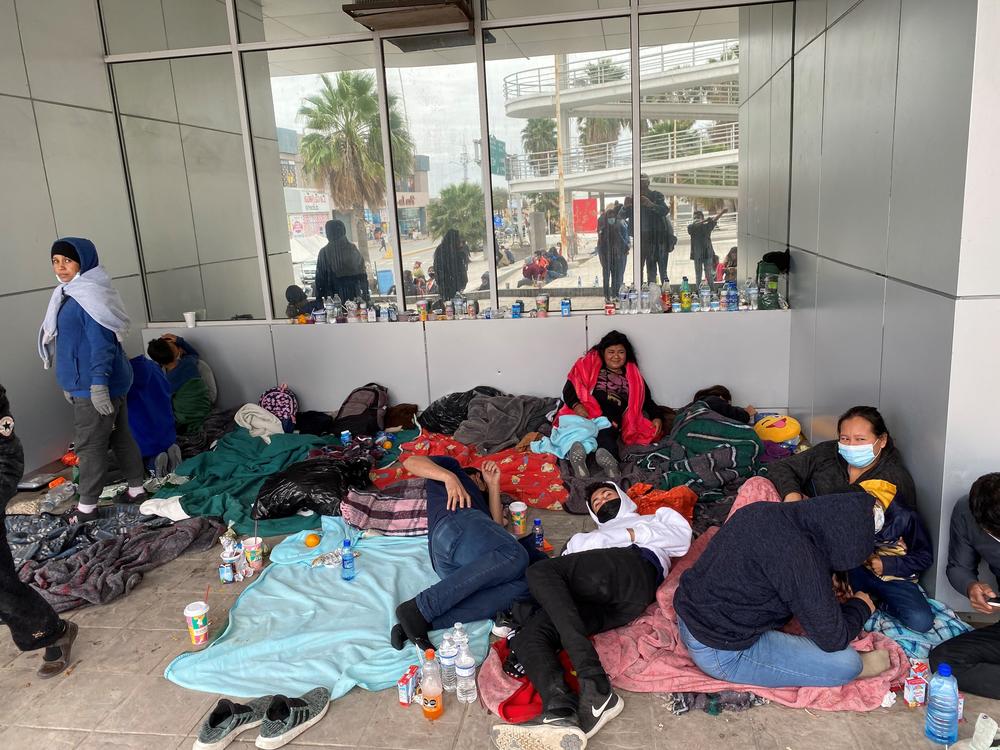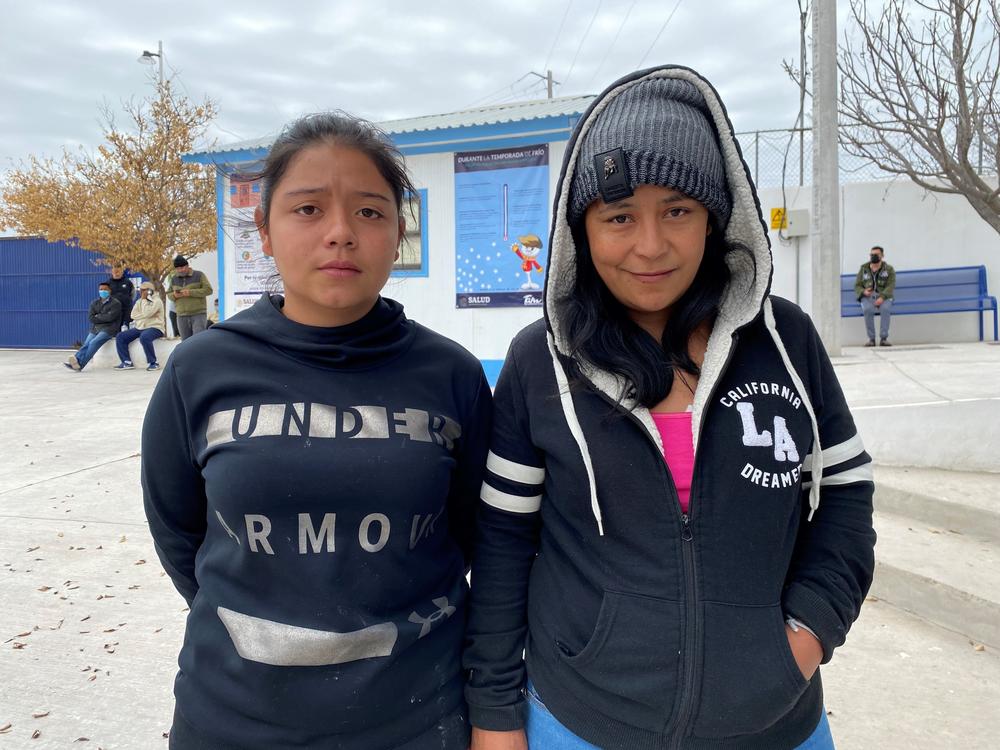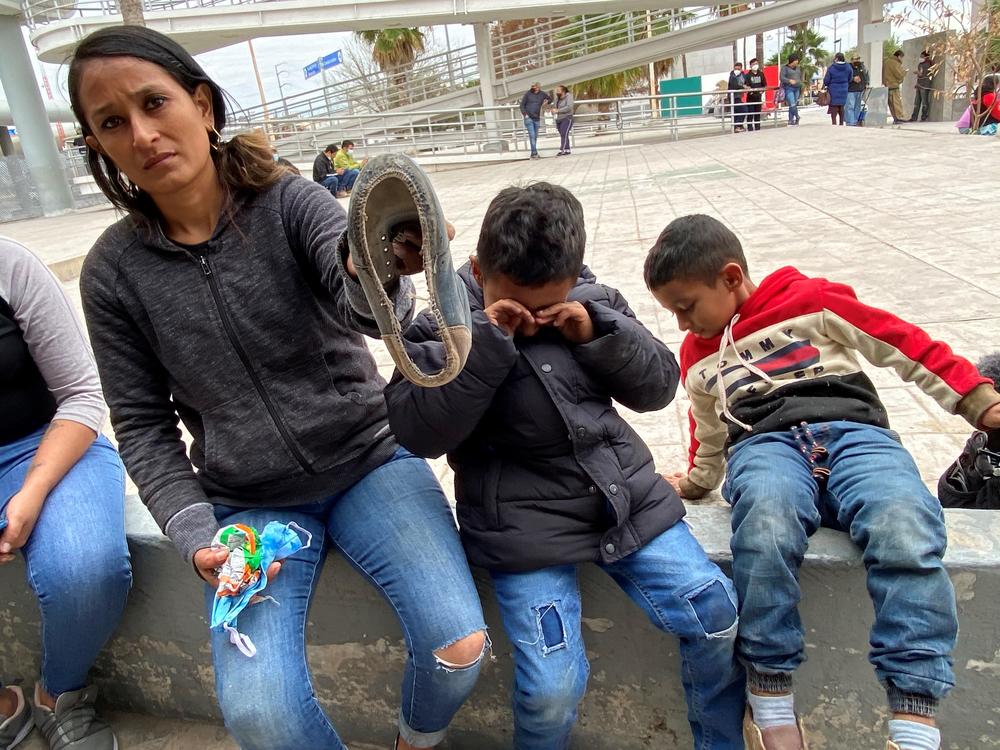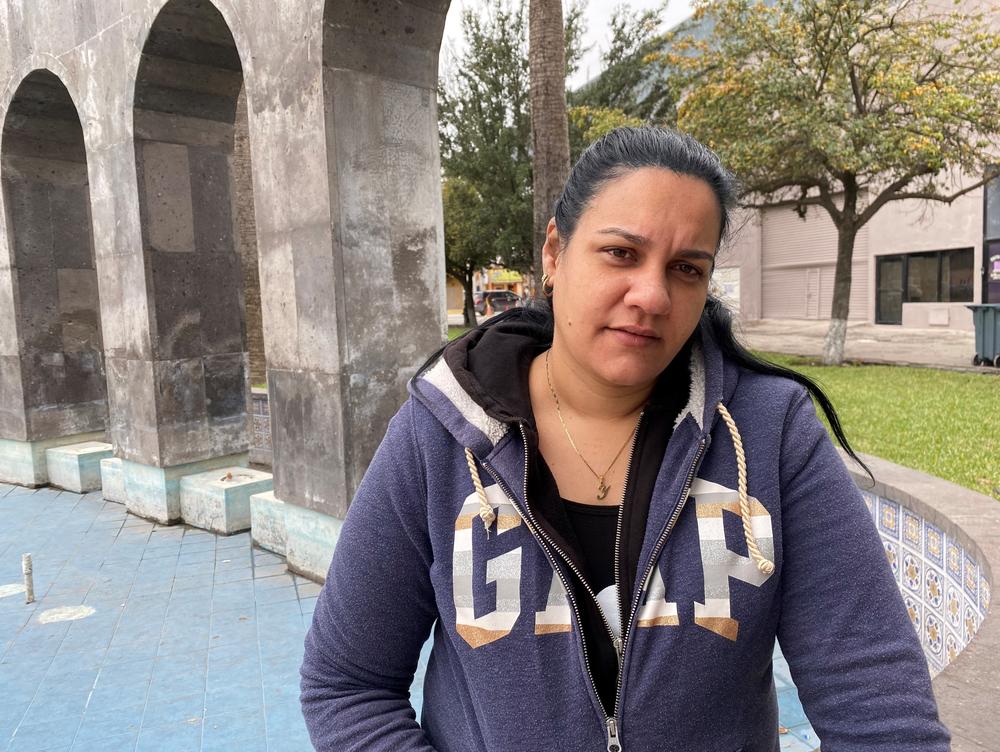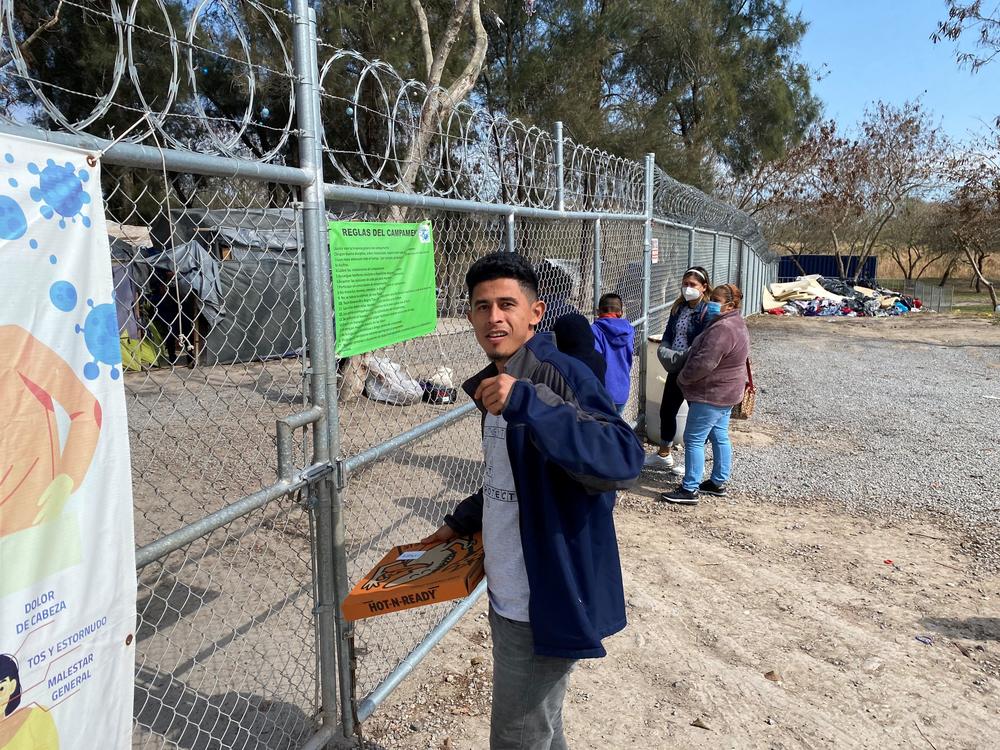Section Branding
Header Content
Asylum-Seekers Are Entering The U.S. Again — But Many More Migrants Are Left Behind
Primary Content
Sandra Zuniga and her teenaged son, Elder, are among the lucky ones.
Earlier this week, the Honduran migrants walked across the international bridge from the infamous migrant camp in Matamoros, Mexico, received a notice to appear in U.S. immigration court, and settled into a cozy condo in Brownsville, Texas.
"Glory be to God," Zuniga says. "The day I arrived I spent the whole day crying — to end up in such a beautiful place with my own bedroom and bathroom. We passed a great test in the camp. Some people even doubted the existence of God. But we overcame!"
U.S. immigration agents have begun admitting some asylum-seekers after the Biden administration reversed policies put in place by the Trump administration, which had forced them to wait in Mexico while their cases are considered and then suspended most asylum applications because of the pandemic.
But many migrants will not be so lucky.
Left behind are people like Danilo Peraza, also from Honduras. He continues to wait in the squalid encampment in Matamoros even though he's already lost his asylum case. Like many people, he forged close relationships in the adversity of camp life and fell in love with a woman he met there. Now he hopes one day they can reunite.
"She and her daughter crossed the border last Friday," he says. "She didn't want to go without me. She cried and cried and cried, but I had to convince her that she had to go."
And now, even more migrants are surging to the U.S. border.
Dilicia Mejia, who also fled Honduras with her teenaged daughter, is among them. They had been staying in Monterrey, Mexico, for the past year. Then a couple of weeks ago, with President Biden in charge, they hopped a bus to Reynosa, a border town where they're waiting for an opportunity to cross into Hidalgo, Texas.
"This is the faith we have before God," she says. "We know that Joe Biden is a good person who has made a good government."
Border getting "more and more jammed up"
Homeland Security Secretary Alejandro Mayorkas this week called the border situation a "stressful challenge" — stopping short of branding it a crisis. He emphasized the Biden administration has not fully re-opened the border because of the ongoing pandemic, and that now is not the time for more migrants to come.
Mayorkas urged would-be migrants to stay in their home countries and apply for humanitarian relief from there, saying it will take time to fix the nation's broken immigration system.
"We are not saying don't come," Mayorkas said. "We are saying don't come now."
Immigration agents are slowly processing asylum-seekers already enrolled in the Trump-era Remain in Mexico program. There are about 25,000 migrants scattered up and down the border between Matamoros and Tijuana — many waiting well over a year to press their asylum cases in the U.S.
The vast majority of new arrivals are still being expelled to Mexico under pandemic guidelines from the Centers for Disease Control and Prevention.
"If families come, if single adults come to the border, we are obligated to, in the service of public health, to impose the travel restrictions ... and return them to Mexico," Mayorkas said. "And we have done that."
Nonetheless, a growing number of migrants are fleeing crime and poverty in Central America and rushing to the U.S.-Mexico border seeking entry.
"The numbers are growing," says Pastor Hector Silva, who runs a Reynosa migrant shelter, where Mejia and her daughter are staying. Silva has been watching immigration cycles since he opened his doors 26 years ago.
"The border is getting more and more jammed up with people who were either fooled into coming here or misunderstood the new American government."
The Border Patrol is arresting more than 1,200 unauthorized migrants a day in the Rio Grande Valley in Texas, according to Customs and Border Protection. That's a sharp jump over recent months.
False expectations
So many migrants are now crossing into the U.S. that the administration has opened two family shelters and re-opened a facility for unaccompanied children in Texas.
In addition, NPR has learned, the administration is planning to convert two large migrant detention centers into processing centers so that asylum-seekers can be released into the country more quickly.
In Mexico, this is what that U.S. policy of expulsion looks like: About 150 mothers and young children are sleeping on the cold, hard plaza of a Mexican federal building in Reynosa. They're filthy and miserable. Their sneakers still caked with the mud of their failed trek north.
"Where we are now, the Mexican officials have said if we don't leave here they'll spray us with water. It's lamentable. We're not criminals!" says Olga Damasio, who traveled from Guatemala with her young daughter, Meyli.
They crossed over the Rio Grande in the last couple weeks with the false expectation that every family with kids would be allowed to stay under the new Biden policies. They were detained by Customs and Border Protection and returned to Mexico.
"They dumped us here three days ago on the bridge; they left us here without any explanation," Damasio says. "We thought the new president would create new opportunities for migrants, but from what we've seen there is nothing for us."
"Not fair that they don't acknowledge us"
There is a lot of confusion about the new policies. Several mothers in Reynosa, including Iris Coto from Honduras, say U.S. border agents told them they are only admitting, as humanitarian cases, mothers with very young children. Coto, who was traveling with her 8-year-old twin boys, says agents told her they didn't qualify. She was incredulous.
"They're all children and they all need help!" she says.
CBP officials declined to comment on these mothers' accounts.
There is also confusion — and anxiety — over how the administration is selecting the asylum-seekers enrolled in Remain in Mexico who are allowed to cross.
About 400 Cubans have been waiting in Reynosa. Many are crowded into apartments and doing odd jobs around town.
"Our uncertainty is enormous because no one in Reynosa has crossed yet," says Yady Milan, a 34-year-old Cuban chemist who's trying to get to Miami. "I understand the camp in Matamoros was in precarious condition. But it's not fair that they don't acknowledge us here in Reynosa."
The nearly empty Matamoros camp looks like a deserted shanty town, with abandoned camping tents flapping in the Gulf breeze and city workers hauling away great piles of garbage and personal belongings left behind.
Finally got a break
A month ago, the camp teemed with more than 600 migrants. U.S. immigration agents began processing migrants there first, in part, because of the intense international focus on wretched conditions at the camp.
Amy Maldonado, a pro bono attorney with the nonprofit ALDEA — The People's Justice Center, has several clients who are seeking asylum and are enrolled in Remain in Mexico. Some ended up living in the Matamoros camp "without services, without jobs, without support," she says.
The Trump-era policy "was a way to make asylum-seekers suffer so much that they would give up and go away," Maldonado says.
One of her clients, though, finally got a break when Biden reversed that policy. Manfredo, 20, was admitted into U.S. last week after more than a year in Matamoros — carrying nothing but a backpack with a shirt and some papers. NPR is not using his full name because Maldonado fears it could affect his asylum case.
Once Manfredo, who is from Honduras, tested negative for COVID-19, he was allowed to cross into Brownsville. Now Manfredo lives with his extended family in Florida, where he will wait until he can present his case to a judge, which could take years.
"God will still deliver"
"If he wins his case, he will get a green card," she says. "If he doesn't win his case, he's got an appeals process, and ultimately he would have to leave if he doesn't win."
Dozens of asylum-seekers are being processed daily at three ports of entry.
Sandra Zuniga, the early beneficiary of the Biden policy change, says she fled Honduras with her son to get away from an abusive husband and violent extortionists in her neighborhood. She recalls when her kindergarten students at a free school in the Matamoros camp realized their ordeal was finally over.
"There was a little boy who told me goodbye, crying. He always asked me, 'Teacher, when can we leave here?' He gave me a big hug and said through his tears, 'At last, teacher, we are crossing over.' "
But it's bittersweet for people like Danilo Peraza, who says he fled Honduras to escape thugs and corrupt police in his home country. He's staying in Matamoros despite his harrowing time there, including a mugging last year that left his face a swollen mass of bruises.
Peraza says he believes God will still deliver him across the border, if the Biden administration will have mercy on people like him who have suffered in the camp for so long.
"There is sadness, because we were left behind," Peraza says. "But there is happiness because so many have been able to leave and finally get into the United States."
Copyright 2021 NPR. To see more, visit https://www.npr.org.
Bottom Content

